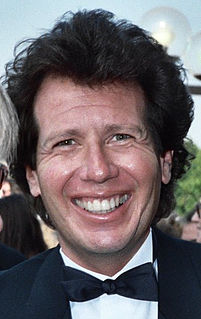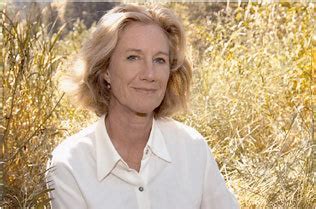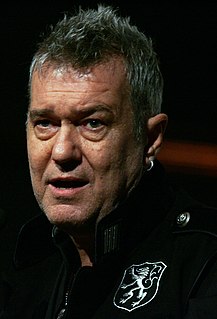A Quote by Garry Shandling
That's what we were exploring on 'Larry Sanders' - the human qualities that have brought us to where we are now in the world: the addiction to needing more and wanting more and talking more. We were examining the labels put on success - is it successful to be on TV every day, to be famous, to have a paycheck?
Related Quotes
At the beginning of the Larry Sanders show, you know, we were grateful to get guests. At the end, it was as if we actually were The Tonight Show. People would come on, and it had the same sort of imprimatur as if we were on the air. I've been on a lot of talk shows during that time and since then, and people would come up in the dressing room or in the corridors and say, "You guys got it exactly right." Or they would say, "We have Larry Sanders moments every day."
It was palpable, all that wanting: Mother wanting something more, Dad wanting something more, everyone wanting something more. This wasn't going to do for us fifties girls; we were going to have to change the equation even if it meant . . . abstaining from motherhood, because clearly that was where Mother got caught.
Our children are exposed to 10, 20, 30 times the number of words that our great-grandfathers were exposed to. We're exposed in a single day or two to more horror on our Internet Web pages than our great-grandfathers were exposed to in decades of living. We have not created modern minds for that modern world. Science and technology has just dumped it on us. And I think people yearn for it. I think you see it in what's popular. Why are people wanting to learn about meditation and talking about a purpose-driven life? It's because they know more is needed in the modern world.
Once you know what you want and what is important for you to achieve, also define the values associated with it. What is important? That is something a lot of entrepreneurs pass by too quickly. For us, the things that were important were, No. 1, customer success. Nothing is more important to us than making sure every customer is successful in our service.
Jesus was not famous in his day. If there were no Bible, there would have been no record of him. The record belongs to his four disciples; nobody else has ever mentioned him, whether he existed or not. He was not famous. He was not successful. Can you think of a greater failure than Jesus? But, by and by, he became more and more significant; by and by, people recognized him. It takes time.
The theory I'm putting forward here is that storytelling is a genetic characteristic in the sense that early human hunters who were able to organize events into stories were more successful than hunters who weren't—and this success translated directly into reproductive success. In other words, hunters who were storytellers tended to be better represented in the gene pool than hunters who weren't, which (incidentally) accounts for the fact that storytelling isn't just found here and there among human cultures, it's found universally.
You're talking about the 1970s now and not the 1950s. We were all more sophisticated by that time, and I just assumed he was gay. But I do remember when we were all sitting around on a roof one night and Larry turned to me and said, "You do know I'm gay, don't you?" There was a statement made. A declaration. We just never had really talked about it.
In the 1970s, we got a Labor government that put more emphasis on trade with Asia; the Vietnam war ended, and refugees were coming in. We were more part of Asia than America and the rest of the world. There was the proximity, for a start - all these countries and cultures just north of us. It just made sense that that's what we were part of.
In rock music, you have a big success before you turn 30, then there is sort of a decay. Then there is the reunion, and everyone is waiting to hear what you were doing when you were 20, and nobody cares what you are doing at 50 or 60. But the more I continue, the more I produce, the more I play every year in bigger places.
We are equal human beings, and we were born with evil and anger and misunderstanding of what a man is, and so we are as needy and wanting to be part of him, as he, obviously, was needing and wanting to be part of us. And that's why I've really taken the freedom, because it's an adaptation, to give her a voice.


































